HA 3011 Advanced Financial Accounting: IFRS, Theory & Practice
VerifiedAdded on 2023/06/11
|10
|2538
|157
Essay
AI Summary
This essay delves into advanced financial accounting principles, examining the relevance and application of International Financial Reporting Standards (IFRS) in the global market. It critiques the views of CFOs on the utility of IFRS, contrasting them with the objectives of corporate financial reporting, particularly concerning relevance, faithful representation, comparability, and understandability. The essay further discusses public interest theory, economic interest group theory, and capture theory in relation to financial regulation. It analyzes FASB Statement 144, highlighting its alignment with relevance and faithful representation in financial reporting. Finally, it addresses the motivations and effects of directors' decisions regarding the revaluation of plant, property, and equipment, and the subsequent impact on financial statements and shareholders. Desklib provides this and many other solved assignments for students.
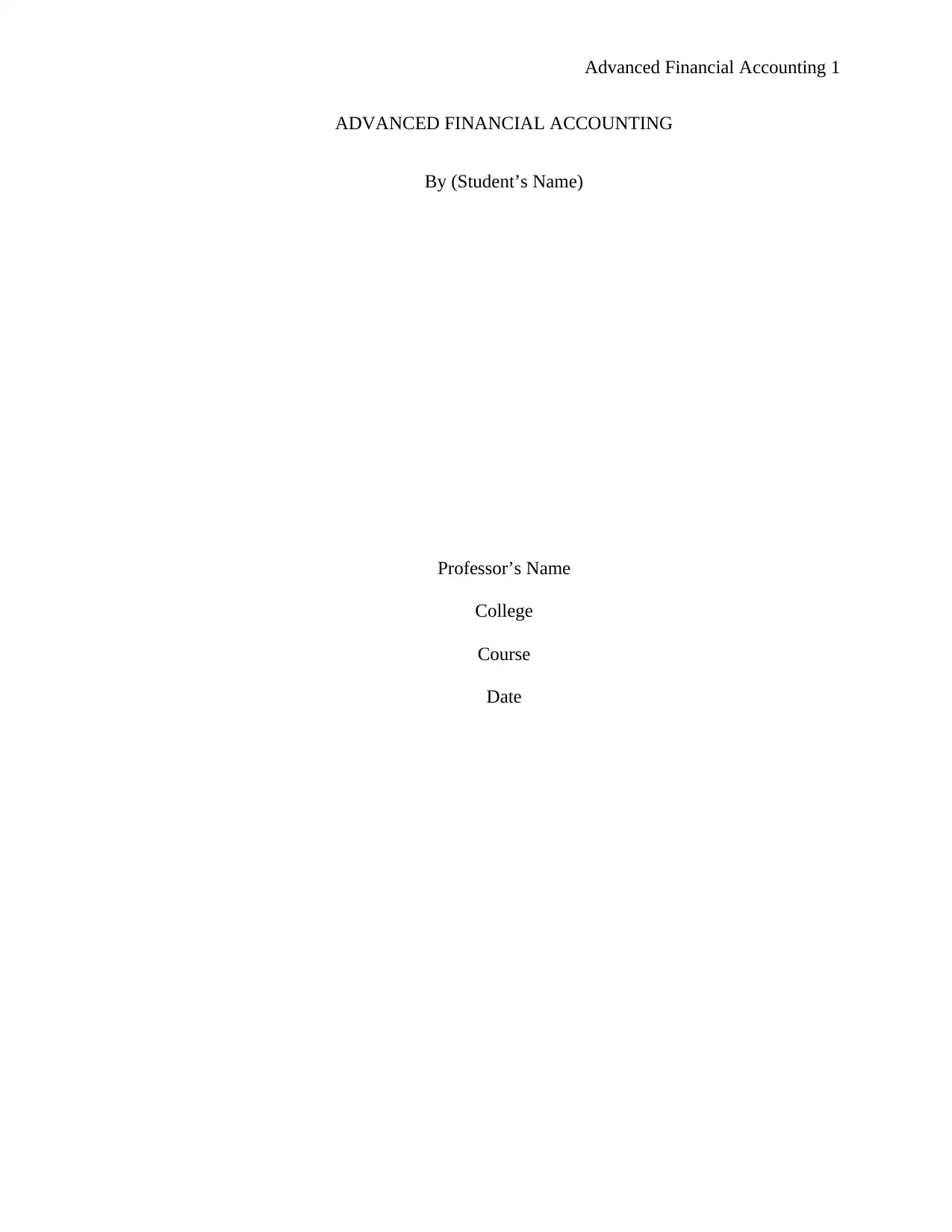
Advanced Financial Accounting 1
ADVANCED FINANCIAL ACCOUNTING
By (Student’s Name)
Professor’s Name
College
Course
Date
ADVANCED FINANCIAL ACCOUNTING
By (Student’s Name)
Professor’s Name
College
Course
Date
Paraphrase This Document
Need a fresh take? Get an instant paraphrase of this document with our AI Paraphraser
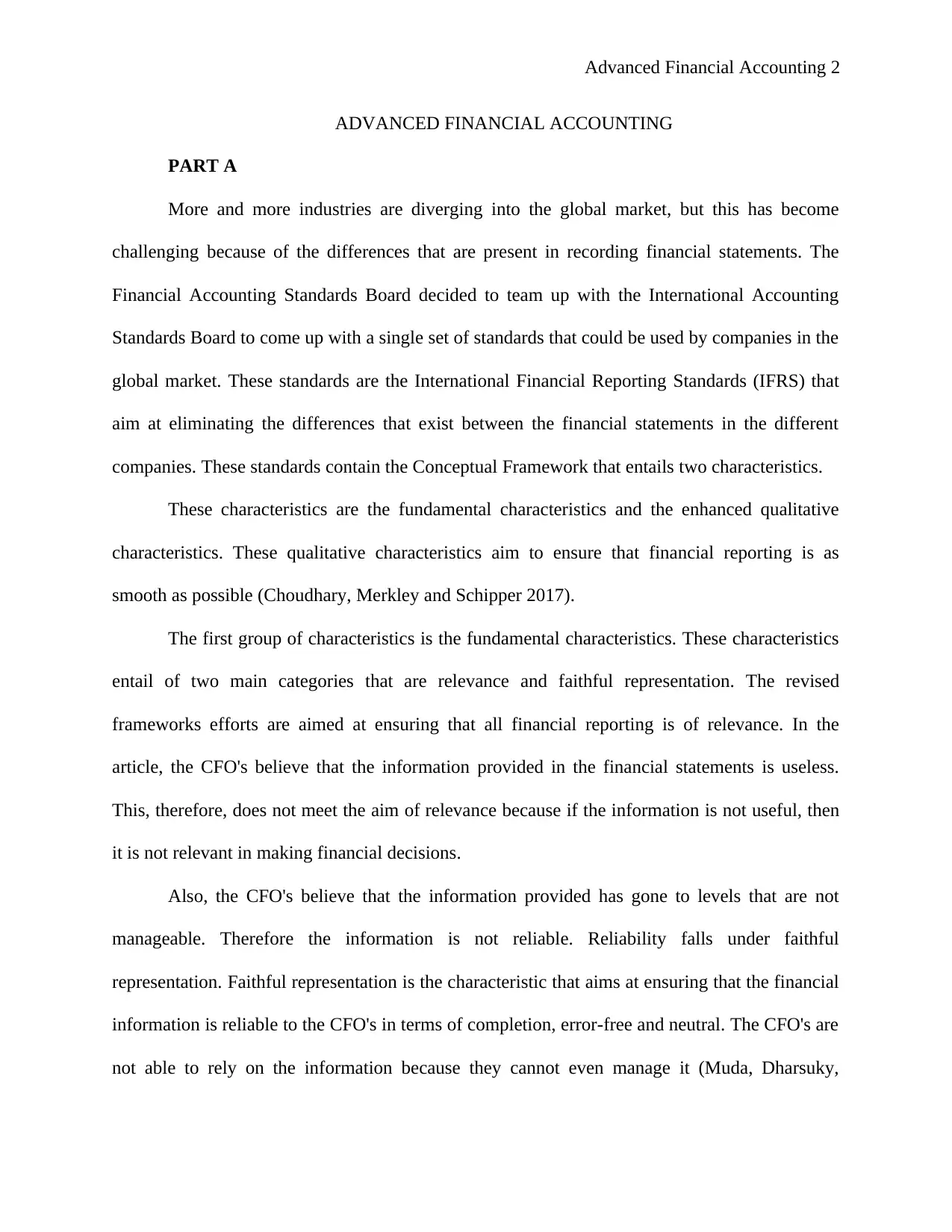
Advanced Financial Accounting 2
ADVANCED FINANCIAL ACCOUNTING
PART A
More and more industries are diverging into the global market, but this has become
challenging because of the differences that are present in recording financial statements. The
Financial Accounting Standards Board decided to team up with the International Accounting
Standards Board to come up with a single set of standards that could be used by companies in the
global market. These standards are the International Financial Reporting Standards (IFRS) that
aim at eliminating the differences that exist between the financial statements in the different
companies. These standards contain the Conceptual Framework that entails two characteristics.
These characteristics are the fundamental characteristics and the enhanced qualitative
characteristics. These qualitative characteristics aim to ensure that financial reporting is as
smooth as possible (Choudhary, Merkley and Schipper 2017).
The first group of characteristics is the fundamental characteristics. These characteristics
entail of two main categories that are relevance and faithful representation. The revised
frameworks efforts are aimed at ensuring that all financial reporting is of relevance. In the
article, the CFO's believe that the information provided in the financial statements is useless.
This, therefore, does not meet the aim of relevance because if the information is not useful, then
it is not relevant in making financial decisions.
Also, the CFO's believe that the information provided has gone to levels that are not
manageable. Therefore the information is not reliable. Reliability falls under faithful
representation. Faithful representation is the characteristic that aims at ensuring that the financial
information is reliable to the CFO's in terms of completion, error-free and neutral. The CFO's are
not able to rely on the information because they cannot even manage it (Muda, Dharsuky,
ADVANCED FINANCIAL ACCOUNTING
PART A
More and more industries are diverging into the global market, but this has become
challenging because of the differences that are present in recording financial statements. The
Financial Accounting Standards Board decided to team up with the International Accounting
Standards Board to come up with a single set of standards that could be used by companies in the
global market. These standards are the International Financial Reporting Standards (IFRS) that
aim at eliminating the differences that exist between the financial statements in the different
companies. These standards contain the Conceptual Framework that entails two characteristics.
These characteristics are the fundamental characteristics and the enhanced qualitative
characteristics. These qualitative characteristics aim to ensure that financial reporting is as
smooth as possible (Choudhary, Merkley and Schipper 2017).
The first group of characteristics is the fundamental characteristics. These characteristics
entail of two main categories that are relevance and faithful representation. The revised
frameworks efforts are aimed at ensuring that all financial reporting is of relevance. In the
article, the CFO's believe that the information provided in the financial statements is useless.
This, therefore, does not meet the aim of relevance because if the information is not useful, then
it is not relevant in making financial decisions.
Also, the CFO's believe that the information provided has gone to levels that are not
manageable. Therefore the information is not reliable. Reliability falls under faithful
representation. Faithful representation is the characteristic that aims at ensuring that the financial
information is reliable to the CFO's in terms of completion, error-free and neutral. The CFO's are
not able to rely on the information because they cannot even manage it (Muda, Dharsuky,
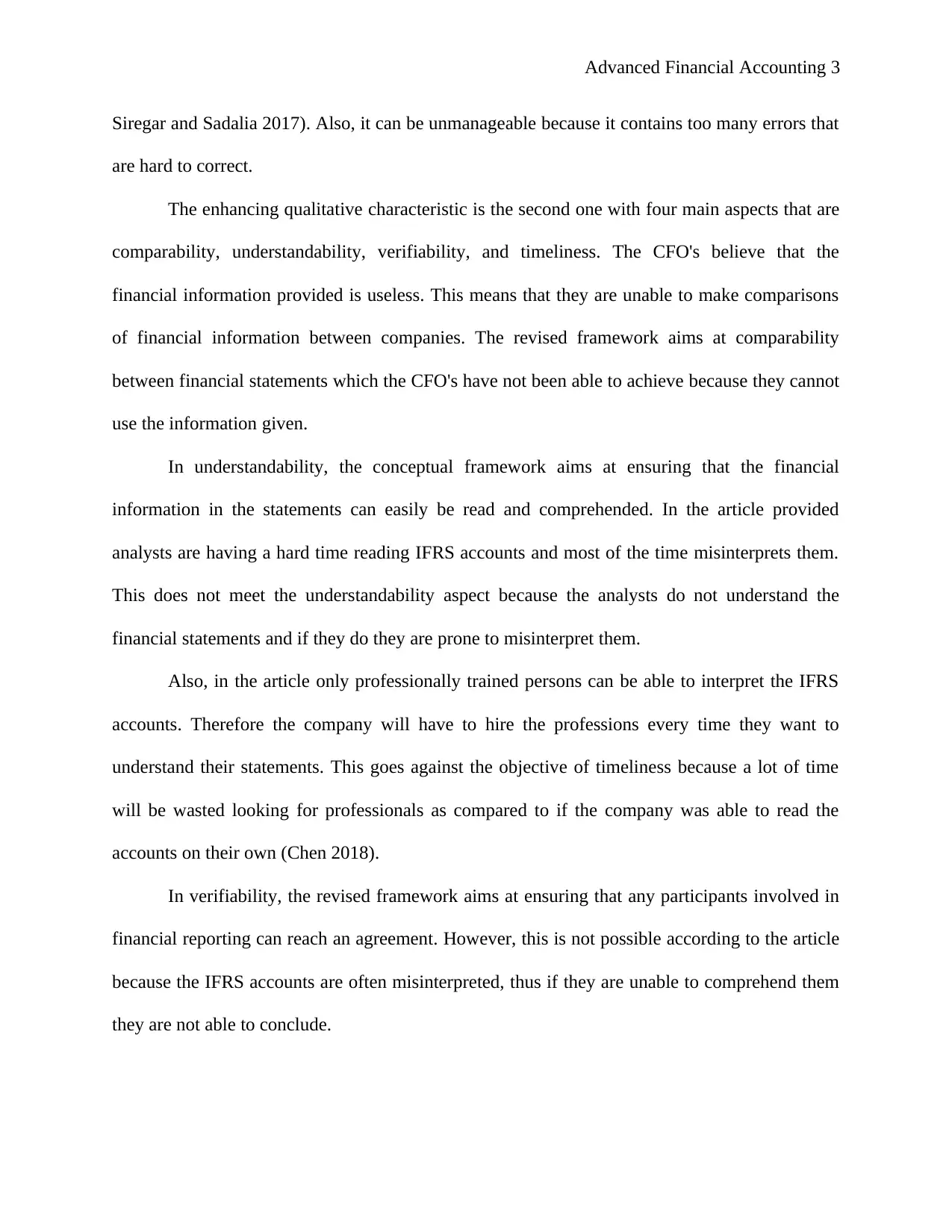
Advanced Financial Accounting 3
Siregar and Sadalia 2017). Also, it can be unmanageable because it contains too many errors that
are hard to correct.
The enhancing qualitative characteristic is the second one with four main aspects that are
comparability, understandability, verifiability, and timeliness. The CFO's believe that the
financial information provided is useless. This means that they are unable to make comparisons
of financial information between companies. The revised framework aims at comparability
between financial statements which the CFO's have not been able to achieve because they cannot
use the information given.
In understandability, the conceptual framework aims at ensuring that the financial
information in the statements can easily be read and comprehended. In the article provided
analysts are having a hard time reading IFRS accounts and most of the time misinterprets them.
This does not meet the understandability aspect because the analysts do not understand the
financial statements and if they do they are prone to misinterpret them.
Also, in the article only professionally trained persons can be able to interpret the IFRS
accounts. Therefore the company will have to hire the professions every time they want to
understand their statements. This goes against the objective of timeliness because a lot of time
will be wasted looking for professionals as compared to if the company was able to read the
accounts on their own (Chen 2018).
In verifiability, the revised framework aims at ensuring that any participants involved in
financial reporting can reach an agreement. However, this is not possible according to the article
because the IFRS accounts are often misinterpreted, thus if they are unable to comprehend them
they are not able to conclude.
Siregar and Sadalia 2017). Also, it can be unmanageable because it contains too many errors that
are hard to correct.
The enhancing qualitative characteristic is the second one with four main aspects that are
comparability, understandability, verifiability, and timeliness. The CFO's believe that the
financial information provided is useless. This means that they are unable to make comparisons
of financial information between companies. The revised framework aims at comparability
between financial statements which the CFO's have not been able to achieve because they cannot
use the information given.
In understandability, the conceptual framework aims at ensuring that the financial
information in the statements can easily be read and comprehended. In the article provided
analysts are having a hard time reading IFRS accounts and most of the time misinterprets them.
This does not meet the understandability aspect because the analysts do not understand the
financial statements and if they do they are prone to misinterpret them.
Also, in the article only professionally trained persons can be able to interpret the IFRS
accounts. Therefore the company will have to hire the professions every time they want to
understand their statements. This goes against the objective of timeliness because a lot of time
will be wasted looking for professionals as compared to if the company was able to read the
accounts on their own (Chen 2018).
In verifiability, the revised framework aims at ensuring that any participants involved in
financial reporting can reach an agreement. However, this is not possible according to the article
because the IFRS accounts are often misinterpreted, thus if they are unable to comprehend them
they are not able to conclude.
⊘ This is a preview!⊘
Do you want full access?
Subscribe today to unlock all pages.

Trusted by 1+ million students worldwide
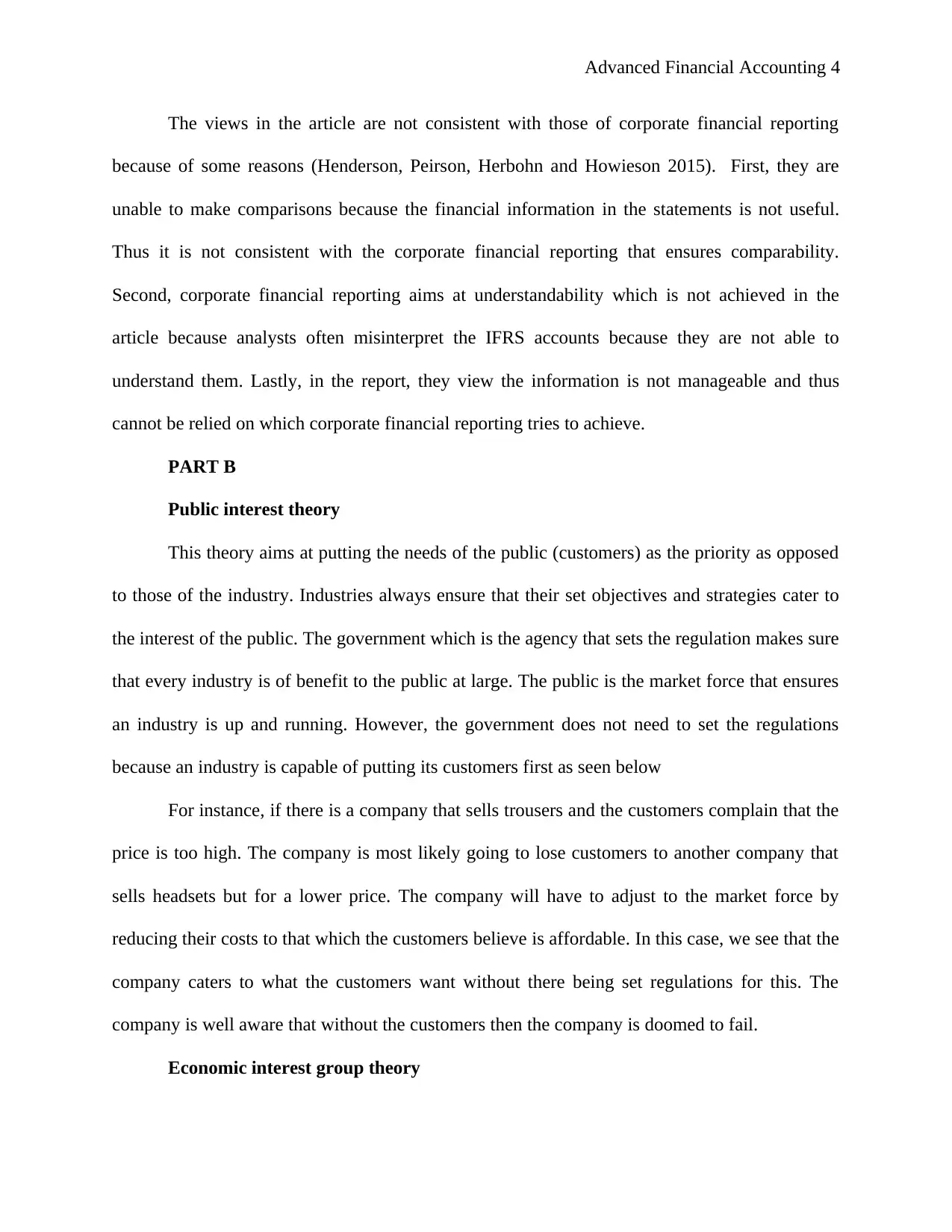
Advanced Financial Accounting 4
The views in the article are not consistent with those of corporate financial reporting
because of some reasons (Henderson, Peirson, Herbohn and Howieson 2015). First, they are
unable to make comparisons because the financial information in the statements is not useful.
Thus it is not consistent with the corporate financial reporting that ensures comparability.
Second, corporate financial reporting aims at understandability which is not achieved in the
article because analysts often misinterpret the IFRS accounts because they are not able to
understand them. Lastly, in the report, they view the information is not manageable and thus
cannot be relied on which corporate financial reporting tries to achieve.
PART B
Public interest theory
This theory aims at putting the needs of the public (customers) as the priority as opposed
to those of the industry. Industries always ensure that their set objectives and strategies cater to
the interest of the public. The government which is the agency that sets the regulation makes sure
that every industry is of benefit to the public at large. The public is the market force that ensures
an industry is up and running. However, the government does not need to set the regulations
because an industry is capable of putting its customers first as seen below
For instance, if there is a company that sells trousers and the customers complain that the
price is too high. The company is most likely going to lose customers to another company that
sells headsets but for a lower price. The company will have to adjust to the market force by
reducing their costs to that which the customers believe is affordable. In this case, we see that the
company caters to what the customers want without there being set regulations for this. The
company is well aware that without the customers then the company is doomed to fail.
Economic interest group theory
The views in the article are not consistent with those of corporate financial reporting
because of some reasons (Henderson, Peirson, Herbohn and Howieson 2015). First, they are
unable to make comparisons because the financial information in the statements is not useful.
Thus it is not consistent with the corporate financial reporting that ensures comparability.
Second, corporate financial reporting aims at understandability which is not achieved in the
article because analysts often misinterpret the IFRS accounts because they are not able to
understand them. Lastly, in the report, they view the information is not manageable and thus
cannot be relied on which corporate financial reporting tries to achieve.
PART B
Public interest theory
This theory aims at putting the needs of the public (customers) as the priority as opposed
to those of the industry. Industries always ensure that their set objectives and strategies cater to
the interest of the public. The government which is the agency that sets the regulation makes sure
that every industry is of benefit to the public at large. The public is the market force that ensures
an industry is up and running. However, the government does not need to set the regulations
because an industry is capable of putting its customers first as seen below
For instance, if there is a company that sells trousers and the customers complain that the
price is too high. The company is most likely going to lose customers to another company that
sells headsets but for a lower price. The company will have to adjust to the market force by
reducing their costs to that which the customers believe is affordable. In this case, we see that the
company caters to what the customers want without there being set regulations for this. The
company is well aware that without the customers then the company is doomed to fail.
Economic interest group theory
Paraphrase This Document
Need a fresh take? Get an instant paraphrase of this document with our AI Paraphraser
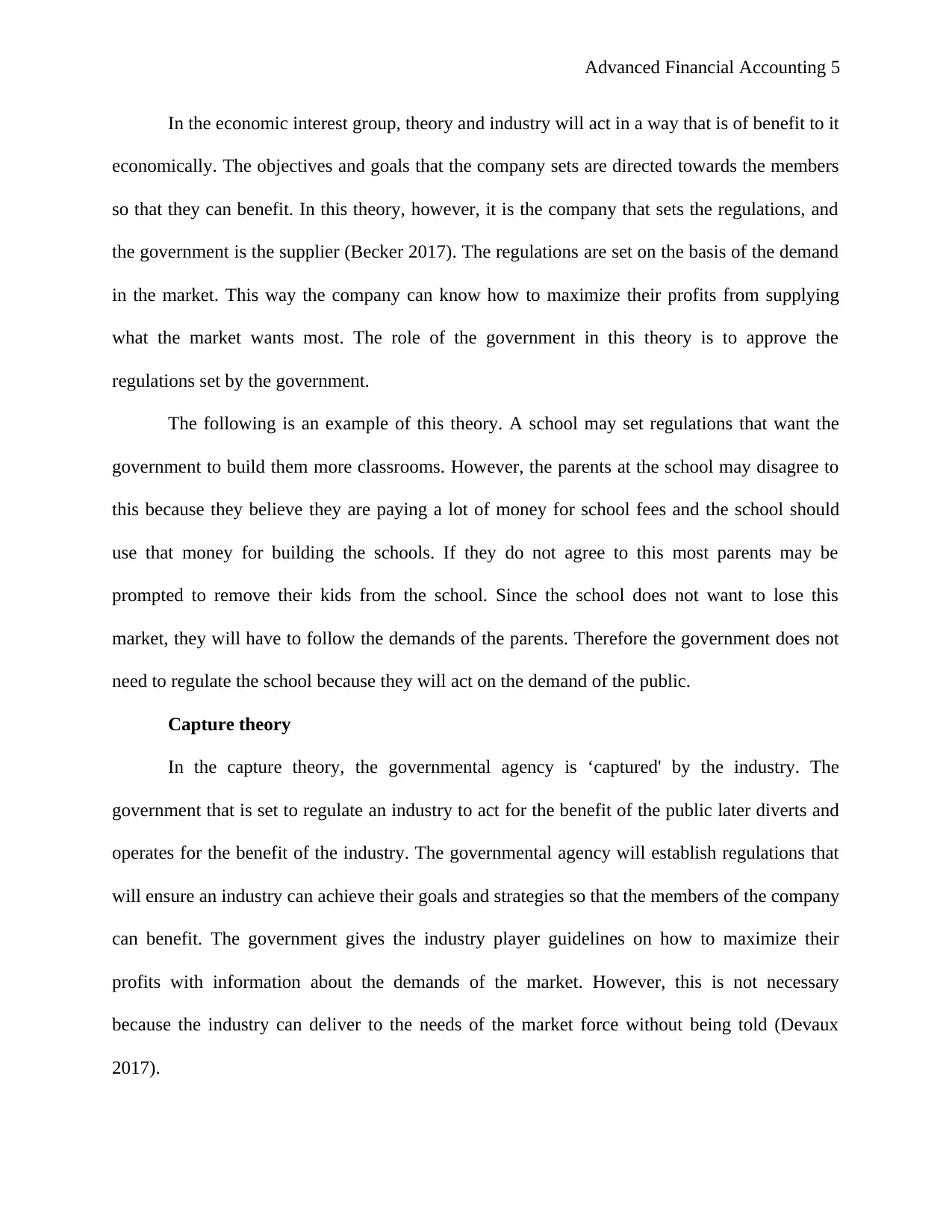
Advanced Financial Accounting 5
In the economic interest group, theory and industry will act in a way that is of benefit to it
economically. The objectives and goals that the company sets are directed towards the members
so that they can benefit. In this theory, however, it is the company that sets the regulations, and
the government is the supplier (Becker 2017). The regulations are set on the basis of the demand
in the market. This way the company can know how to maximize their profits from supplying
what the market wants most. The role of the government in this theory is to approve the
regulations set by the government.
The following is an example of this theory. A school may set regulations that want the
government to build them more classrooms. However, the parents at the school may disagree to
this because they believe they are paying a lot of money for school fees and the school should
use that money for building the schools. If they do not agree to this most parents may be
prompted to remove their kids from the school. Since the school does not want to lose this
market, they will have to follow the demands of the parents. Therefore the government does not
need to regulate the school because they will act on the demand of the public.
Capture theory
In the capture theory, the governmental agency is ‘captured' by the industry. The
government that is set to regulate an industry to act for the benefit of the public later diverts and
operates for the benefit of the industry. The governmental agency will establish regulations that
will ensure an industry can achieve their goals and strategies so that the members of the company
can benefit. The government gives the industry player guidelines on how to maximize their
profits with information about the demands of the market. However, this is not necessary
because the industry can deliver to the needs of the market force without being told (Devaux
2017).
In the economic interest group, theory and industry will act in a way that is of benefit to it
economically. The objectives and goals that the company sets are directed towards the members
so that they can benefit. In this theory, however, it is the company that sets the regulations, and
the government is the supplier (Becker 2017). The regulations are set on the basis of the demand
in the market. This way the company can know how to maximize their profits from supplying
what the market wants most. The role of the government in this theory is to approve the
regulations set by the government.
The following is an example of this theory. A school may set regulations that want the
government to build them more classrooms. However, the parents at the school may disagree to
this because they believe they are paying a lot of money for school fees and the school should
use that money for building the schools. If they do not agree to this most parents may be
prompted to remove their kids from the school. Since the school does not want to lose this
market, they will have to follow the demands of the parents. Therefore the government does not
need to regulate the school because they will act on the demand of the public.
Capture theory
In the capture theory, the governmental agency is ‘captured' by the industry. The
government that is set to regulate an industry to act for the benefit of the public later diverts and
operates for the benefit of the industry. The governmental agency will establish regulations that
will ensure an industry can achieve their goals and strategies so that the members of the company
can benefit. The government gives the industry player guidelines on how to maximize their
profits with information about the demands of the market. However, this is not necessary
because the industry can deliver to the needs of the market force without being told (Devaux
2017).
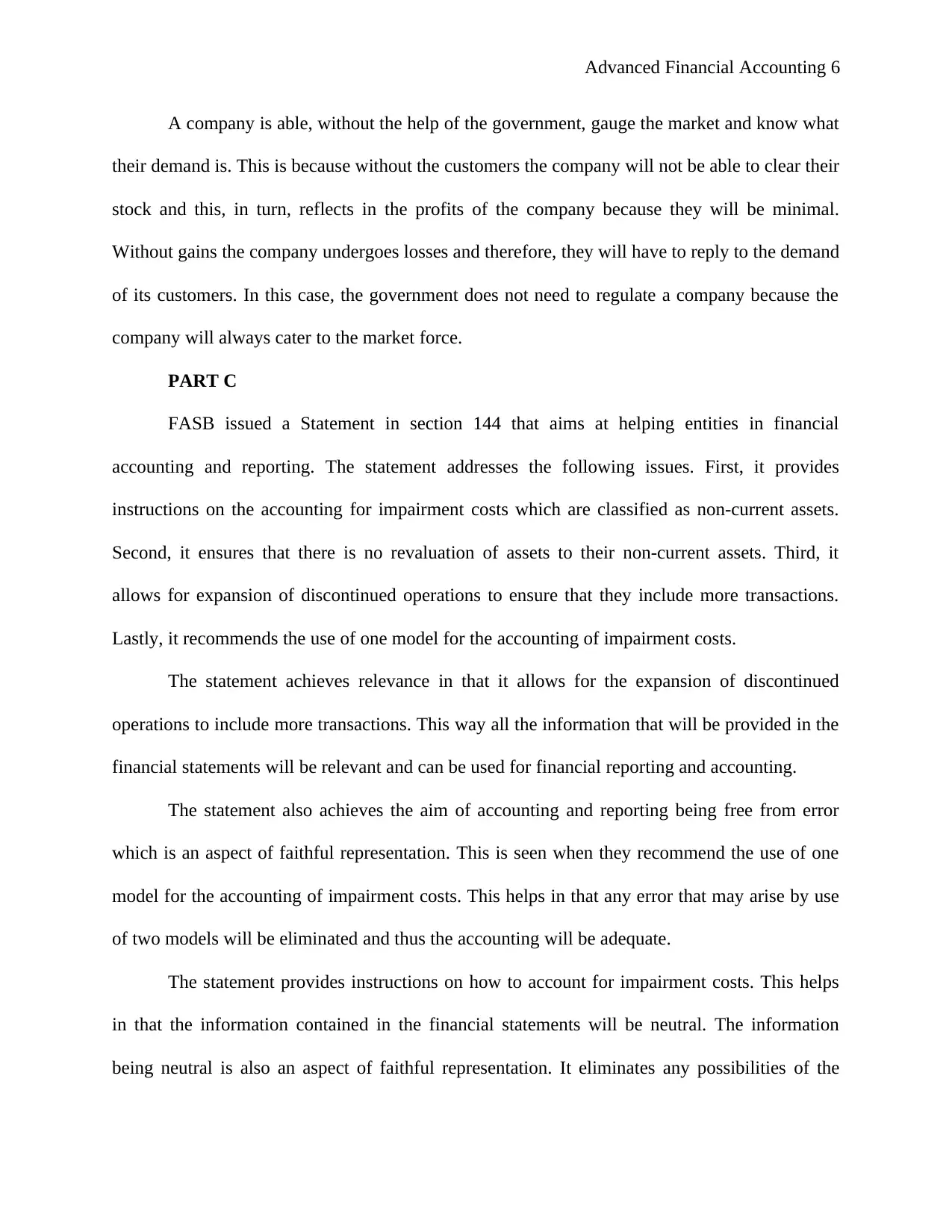
Advanced Financial Accounting 6
A company is able, without the help of the government, gauge the market and know what
their demand is. This is because without the customers the company will not be able to clear their
stock and this, in turn, reflects in the profits of the company because they will be minimal.
Without gains the company undergoes losses and therefore, they will have to reply to the demand
of its customers. In this case, the government does not need to regulate a company because the
company will always cater to the market force.
PART C
FASB issued a Statement in section 144 that aims at helping entities in financial
accounting and reporting. The statement addresses the following issues. First, it provides
instructions on the accounting for impairment costs which are classified as non-current assets.
Second, it ensures that there is no revaluation of assets to their non-current assets. Third, it
allows for expansion of discontinued operations to ensure that they include more transactions.
Lastly, it recommends the use of one model for the accounting of impairment costs.
The statement achieves relevance in that it allows for the expansion of discontinued
operations to include more transactions. This way all the information that will be provided in the
financial statements will be relevant and can be used for financial reporting and accounting.
The statement also achieves the aim of accounting and reporting being free from error
which is an aspect of faithful representation. This is seen when they recommend the use of one
model for the accounting of impairment costs. This helps in that any error that may arise by use
of two models will be eliminated and thus the accounting will be adequate.
The statement provides instructions on how to account for impairment costs. This helps
in that the information contained in the financial statements will be neutral. The information
being neutral is also an aspect of faithful representation. It eliminates any possibilities of the
A company is able, without the help of the government, gauge the market and know what
their demand is. This is because without the customers the company will not be able to clear their
stock and this, in turn, reflects in the profits of the company because they will be minimal.
Without gains the company undergoes losses and therefore, they will have to reply to the demand
of its customers. In this case, the government does not need to regulate a company because the
company will always cater to the market force.
PART C
FASB issued a Statement in section 144 that aims at helping entities in financial
accounting and reporting. The statement addresses the following issues. First, it provides
instructions on the accounting for impairment costs which are classified as non-current assets.
Second, it ensures that there is no revaluation of assets to their non-current assets. Third, it
allows for expansion of discontinued operations to ensure that they include more transactions.
Lastly, it recommends the use of one model for the accounting of impairment costs.
The statement achieves relevance in that it allows for the expansion of discontinued
operations to include more transactions. This way all the information that will be provided in the
financial statements will be relevant and can be used for financial reporting and accounting.
The statement also achieves the aim of accounting and reporting being free from error
which is an aspect of faithful representation. This is seen when they recommend the use of one
model for the accounting of impairment costs. This helps in that any error that may arise by use
of two models will be eliminated and thus the accounting will be adequate.
The statement provides instructions on how to account for impairment costs. This helps
in that the information contained in the financial statements will be neutral. The information
being neutral is also an aspect of faithful representation. It eliminates any possibilities of the
⊘ This is a preview!⊘
Do you want full access?
Subscribe today to unlock all pages.

Trusted by 1+ million students worldwide
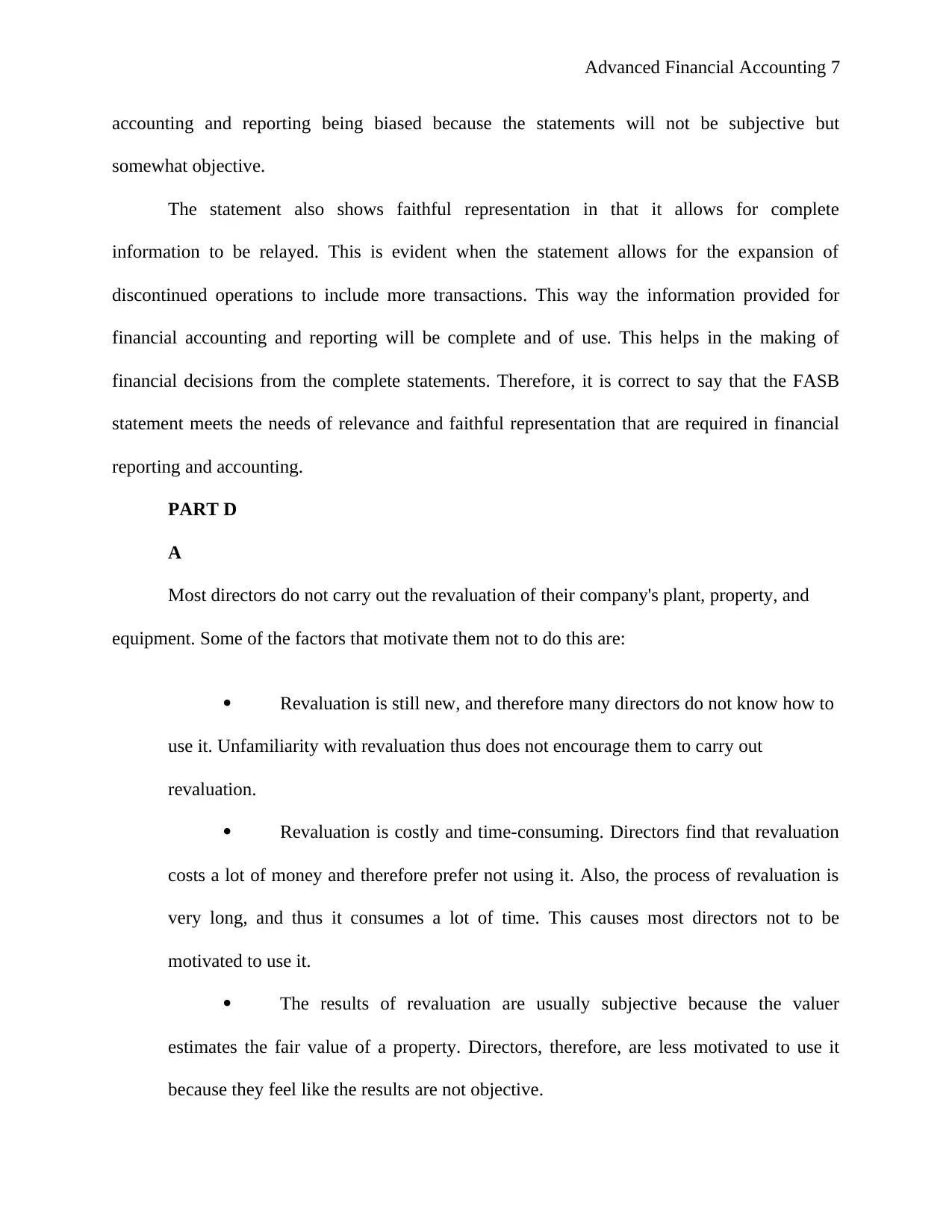
Advanced Financial Accounting 7
accounting and reporting being biased because the statements will not be subjective but
somewhat objective.
The statement also shows faithful representation in that it allows for complete
information to be relayed. This is evident when the statement allows for the expansion of
discontinued operations to include more transactions. This way the information provided for
financial accounting and reporting will be complete and of use. This helps in the making of
financial decisions from the complete statements. Therefore, it is correct to say that the FASB
statement meets the needs of relevance and faithful representation that are required in financial
reporting and accounting.
PART D
A
Most directors do not carry out the revaluation of their company's plant, property, and
equipment. Some of the factors that motivate them not to do this are:
Revaluation is still new, and therefore many directors do not know how to
use it. Unfamiliarity with revaluation thus does not encourage them to carry out
revaluation.
Revaluation is costly and time-consuming. Directors find that revaluation
costs a lot of money and therefore prefer not using it. Also, the process of revaluation is
very long, and thus it consumes a lot of time. This causes most directors not to be
motivated to use it.
The results of revaluation are usually subjective because the valuer
estimates the fair value of a property. Directors, therefore, are less motivated to use it
because they feel like the results are not objective.
accounting and reporting being biased because the statements will not be subjective but
somewhat objective.
The statement also shows faithful representation in that it allows for complete
information to be relayed. This is evident when the statement allows for the expansion of
discontinued operations to include more transactions. This way the information provided for
financial accounting and reporting will be complete and of use. This helps in the making of
financial decisions from the complete statements. Therefore, it is correct to say that the FASB
statement meets the needs of relevance and faithful representation that are required in financial
reporting and accounting.
PART D
A
Most directors do not carry out the revaluation of their company's plant, property, and
equipment. Some of the factors that motivate them not to do this are:
Revaluation is still new, and therefore many directors do not know how to
use it. Unfamiliarity with revaluation thus does not encourage them to carry out
revaluation.
Revaluation is costly and time-consuming. Directors find that revaluation
costs a lot of money and therefore prefer not using it. Also, the process of revaluation is
very long, and thus it consumes a lot of time. This causes most directors not to be
motivated to use it.
The results of revaluation are usually subjective because the valuer
estimates the fair value of a property. Directors, therefore, are less motivated to use it
because they feel like the results are not objective.
Paraphrase This Document
Need a fresh take? Get an instant paraphrase of this document with our AI Paraphraser
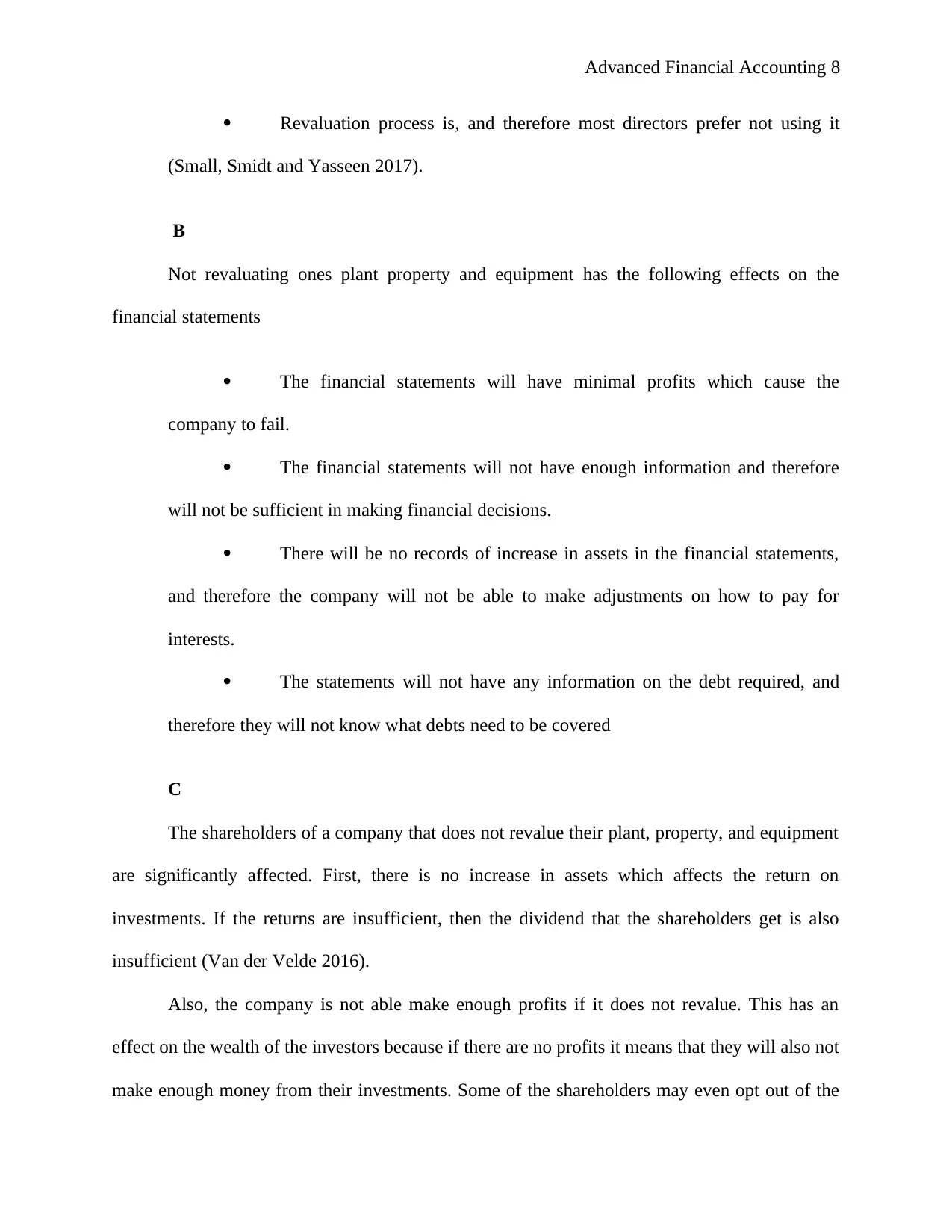
Advanced Financial Accounting 8
Revaluation process is, and therefore most directors prefer not using it
(Small, Smidt and Yasseen 2017).
B
Not revaluating ones plant property and equipment has the following effects on the
financial statements
The financial statements will have minimal profits which cause the
company to fail.
The financial statements will not have enough information and therefore
will not be sufficient in making financial decisions.
There will be no records of increase in assets in the financial statements,
and therefore the company will not be able to make adjustments on how to pay for
interests.
The statements will not have any information on the debt required, and
therefore they will not know what debts need to be covered
C
The shareholders of a company that does not revalue their plant, property, and equipment
are significantly affected. First, there is no increase in assets which affects the return on
investments. If the returns are insufficient, then the dividend that the shareholders get is also
insufficient (Van der Velde 2016).
Also, the company is not able make enough profits if it does not revalue. This has an
effect on the wealth of the investors because if there are no profits it means that they will also not
make enough money from their investments. Some of the shareholders may even opt out of the
Revaluation process is, and therefore most directors prefer not using it
(Small, Smidt and Yasseen 2017).
B
Not revaluating ones plant property and equipment has the following effects on the
financial statements
The financial statements will have minimal profits which cause the
company to fail.
The financial statements will not have enough information and therefore
will not be sufficient in making financial decisions.
There will be no records of increase in assets in the financial statements,
and therefore the company will not be able to make adjustments on how to pay for
interests.
The statements will not have any information on the debt required, and
therefore they will not know what debts need to be covered
C
The shareholders of a company that does not revalue their plant, property, and equipment
are significantly affected. First, there is no increase in assets which affects the return on
investments. If the returns are insufficient, then the dividend that the shareholders get is also
insufficient (Van der Velde 2016).
Also, the company is not able make enough profits if it does not revalue. This has an
effect on the wealth of the investors because if there are no profits it means that they will also not
make enough money from their investments. Some of the shareholders may even opt out of the

Advanced Financial Accounting 9
company because they are not getting sufficient dividends, but this may also be a problem
because the company will not be able to pay them back their shareholder percentage. Payments
may be made in installments which is not something that the shareholder may want as compared
to one large sum.
company because they are not getting sufficient dividends, but this may also be a problem
because the company will not be able to pay them back their shareholder percentage. Payments
may be made in installments which is not something that the shareholder may want as compared
to one large sum.
⊘ This is a preview!⊘
Do you want full access?
Subscribe today to unlock all pages.

Trusted by 1+ million students worldwide
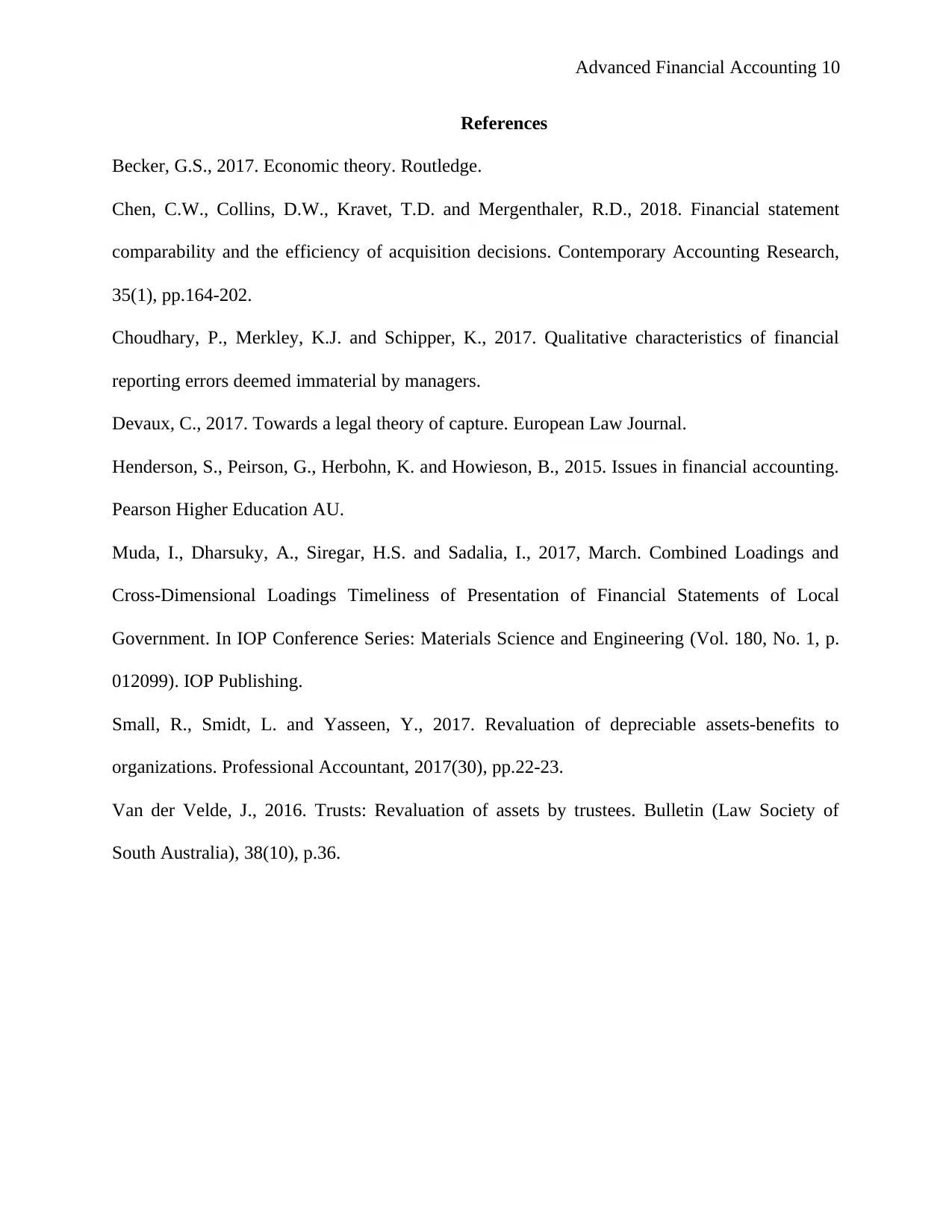
Advanced Financial Accounting 10
References
Becker, G.S., 2017. Economic theory. Routledge.
Chen, C.W., Collins, D.W., Kravet, T.D. and Mergenthaler, R.D., 2018. Financial statement
comparability and the efficiency of acquisition decisions. Contemporary Accounting Research,
35(1), pp.164-202.
Choudhary, P., Merkley, K.J. and Schipper, K., 2017. Qualitative characteristics of financial
reporting errors deemed immaterial by managers.
Devaux, C., 2017. Towards a legal theory of capture. European Law Journal.
Henderson, S., Peirson, G., Herbohn, K. and Howieson, B., 2015. Issues in financial accounting.
Pearson Higher Education AU.
Muda, I., Dharsuky, A., Siregar, H.S. and Sadalia, I., 2017, March. Combined Loadings and
Cross-Dimensional Loadings Timeliness of Presentation of Financial Statements of Local
Government. In IOP Conference Series: Materials Science and Engineering (Vol. 180, No. 1, p.
012099). IOP Publishing.
Small, R., Smidt, L. and Yasseen, Y., 2017. Revaluation of depreciable assets-benefits to
organizations. Professional Accountant, 2017(30), pp.22-23.
Van der Velde, J., 2016. Trusts: Revaluation of assets by trustees. Bulletin (Law Society of
South Australia), 38(10), p.36.
References
Becker, G.S., 2017. Economic theory. Routledge.
Chen, C.W., Collins, D.W., Kravet, T.D. and Mergenthaler, R.D., 2018. Financial statement
comparability and the efficiency of acquisition decisions. Contemporary Accounting Research,
35(1), pp.164-202.
Choudhary, P., Merkley, K.J. and Schipper, K., 2017. Qualitative characteristics of financial
reporting errors deemed immaterial by managers.
Devaux, C., 2017. Towards a legal theory of capture. European Law Journal.
Henderson, S., Peirson, G., Herbohn, K. and Howieson, B., 2015. Issues in financial accounting.
Pearson Higher Education AU.
Muda, I., Dharsuky, A., Siregar, H.S. and Sadalia, I., 2017, March. Combined Loadings and
Cross-Dimensional Loadings Timeliness of Presentation of Financial Statements of Local
Government. In IOP Conference Series: Materials Science and Engineering (Vol. 180, No. 1, p.
012099). IOP Publishing.
Small, R., Smidt, L. and Yasseen, Y., 2017. Revaluation of depreciable assets-benefits to
organizations. Professional Accountant, 2017(30), pp.22-23.
Van der Velde, J., 2016. Trusts: Revaluation of assets by trustees. Bulletin (Law Society of
South Australia), 38(10), p.36.
1 out of 10
Related Documents
Your All-in-One AI-Powered Toolkit for Academic Success.
+13062052269
info@desklib.com
Available 24*7 on WhatsApp / Email
![[object Object]](/_next/static/media/star-bottom.7253800d.svg)
Unlock your academic potential
Copyright © 2020–2026 A2Z Services. All Rights Reserved. Developed and managed by ZUCOL.




